Ten Years After McCain-Feingold, More Money In Politics Than Ever
The 10th anniversary of McCain-Feingold teaches a lesson we should already have learned.
Ten years after McCain-Feingold became law, there’s more money in politics than ever before:
A decade after Sens. John McCain and Russ Feingold spearheaded sweeping legislation to reform the campaign-finance system, a series of judicial and legislative setbacks have derailed any hopes its original sponsors had of curbing the influence and amount of money spent on politics.
Instead, the incredible explosion of money in federal elections demonstrates that McCain-Feingold was a speed bump, at best, on the way to a dramatic growth curve that suggests next year’s contests will cost nearly $3.5 billion.
All told, candidates running for a seat in the House of Representatives spent more than $923 million in 2012, while candidates running for Senate seats dished out $587 million, according to new data compiled for the new edition of Vital Statistics on Congress, a joint publication of the American Enterprise Institute and the Brookings Institution. That’s more than eight times the amount House and Senate candidates spent in 1980. Senate candidates spent twice what they did a decade ago, in 2002.
(…)
Candidates running in each of the five most expensive races last cycle spent a combined total of more than $10 million, according to data compiled by the Center for Responsive Politics. Two of those House seats, held by Democrats Patrick Murphy of Florida and Elizabeth Esty of Connecticut, are likely to be battlegrounds again next year. House Speaker John Boehner, R-Ohio, qualifies as a top spender; his campaign spent a total of $21 million last year, though all but a tiny fraction went to help other Republican candidates. An independent candidate spent $7.5 million of his own money in an effort to oust Democratic Rep. Henry Waxman in a strongly Democratic California district, while Rep. Michele Bachmann’s decision to retire will actually help Minnesota Republicans keep her seat.
A key element of the McCain-Feingold reforms that was aimed at reducing the amount of money in politics, a ban on unregulated so-called soft money, hasn’t slowed either party. In 2002, the last cycle in which parties could raise and spend soft money, the three largest Democratic committees raised a total of $576 million, while their Republican counterparts pulled in $657 million. In the 2012 cycle, limited only to hard-money contributions, Democratic committees raised $631 million and Republican committees pulled in $697 million.
The charts tell the tale. Here’s one that shows candidate spending:
And here’s one that shows the explosive growth in outside spending:
What these numbers reveal is the dirty little secrets of “campaign finance reform.” One of those secrets is that the laws themselves end up planting the seeds of their own utter uselessness by guaranteeing that money will still find a way to influence politics. For every barrier that any campaign finance law has ever created, politicians, donors, and those who seek to gain influence have found perfectly legal ways in which to get around the new rules. This is how we’ve ended up with everything from PACs to SuperPACs to 527’s to 501(c)(4)’s. Each on of these came about thanks largely to efforts to restrict the influence of money in other areas. When the initial campaign finance laws adopted in the wake of Watergate restricted the amount that individual donors could donate to specific campaigns, Political Action Committees came about that allowed people of common interests to join together to make larger donations. When other regulations sought to require full disclosure of donors, existing laws were used to create groups that weren’t required to disclose their donors. When McCain-Feingold sought to restrict the amount political parties could spend so-called “soft money” on campaigns, we saw the rise in outside expenditures reflected in the charge above. If there is future campaign finance reform, the exact same thing will happen.
The other dirty little secret of campaign finance reform over the years is the fact that, whether by intention or not, it has largely operated as an incumbent protection system. By restricting how much campaigns can raise, and from what sources, these laws make it harder for challengers, who typically have lower name recognition and fewer significant political connections, from mounting serious bids against incumbents, especially long-term incumbents. This is why you’ll generally find that most campaign finance laws are supported by bipartisan majorities. The people voting for these laws know that they’ll likely be able to operate within the limits of the new law while anyone trying to challenge them is going to find it much harder to run a successful campaign against an entrenched incumbent. This, I would submit, is a feature of the system not a bug.
The response of some, no doubt, will be to repeat that tired old phrase that we must “get the money out of politics!” As good as that might sounds, such an attitude strikes me as both impossible to achieve and undesirable if it were achievable. As I noted above, money will always find a way to work its way into politics. If it can’t happen in a legal, above-board manner, then it will happen behind the scenes in secret, something I would suggest is far more detrimental to the public interest than what we have today. More importantly, though, as the Supreme Court has recognized several times since it first started hearing cases involving campaign finance laws that, at its base, donating money to a political candidate is as much an act of political speech as handing out campaign literature would be. There are, the Court has said, many good reasons to allow at least some reasonable regulation of political donations, but banning them outright would be as wrong as banning someone’s ability to speak out positively in favor of Candidate X in a public forum. Eliminating that right would be both a bad idea and Unconstitutional.
The lesson from all of this seems clear. Campaign finance “reform” that purports to work by restricting the ability of people to donate to candidates and causes they support is, in the end, doomed to fail and will likely lead to unintended consequences that create more problems than they solve. Instead of going down that route, we ought to be considering reforms that life the limits on contributions while increasing both the frequency and extent of disclosure. That’s a reform that might actually accomplish something by making it easier for the American people see who is attempting to curry favor with the people purporting to represent them.
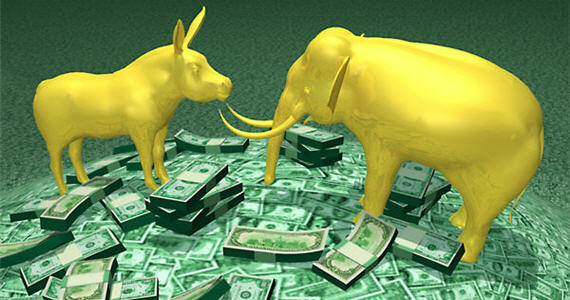
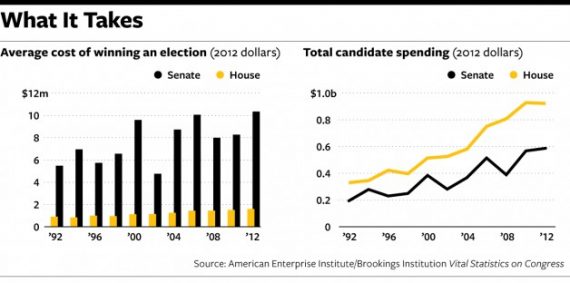
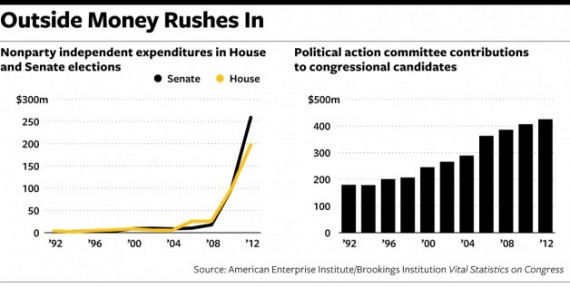

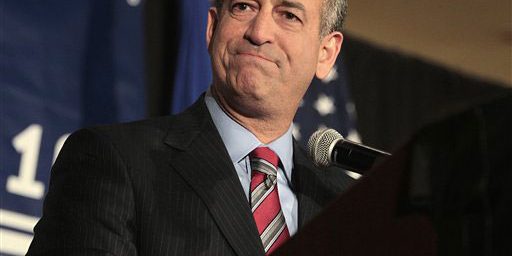

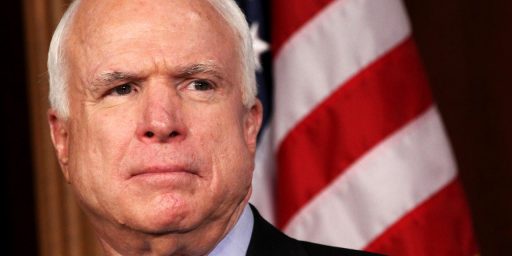


Gosh, it’s like a completely unbroken path from McCain-Feingold to where we are today. Just a continuum, with nothing interrupting it at all.
Oh, yeah, there was a series of 5-4 Supreme Court decisions that basically declared almost any regulation of campaign spending “unconstitutional.” But why bring that up? It just messes up the point that there’s nothing we can do.
Until we find a way to overturn the lunacy of Buckley v. Valeo, we’re never going to solve this problem.
I don’t find Buckley v. Valeo to have been “lunacy”
@Doug Mataconis:
I didn’t suspect that you would.
Money isn’t speech. It is a means of facilitating speech. Preventing you from spending money on political campaigns doesn’t prevent you from speaking.Until we get rid of the fallacy that money does = speech, we’ll never solve the problem.
Which is that we have effectively found a way to legalize bribery in this country.
@HarvardLaw92:
And as I note above, your solution would operate as nothing less than the ultimate Incumbent Protection System.
@Doug Mataconis:
You have no idea what my proposed solution would be, or is, so it’s tenuous ground to make assumptions about it.
But, since you asked …
An across the board ban on ANY political spending by ANYBODY other than the candidates themselves.
An across the board ban on political donations of ANY sort to ANY campaign.
An across the board ban on political advertisements other than those paid for by the candidates themselves.
Public financing of political campaigns, with spending caps, audits, mandated return of unused funds and equal access to public funding for any candidate who wishes to run.
Money doesn’t facilitate politics. It infects it, and you deal with infections by removing them.
@Doug Mataconis: You shouldn’t have asked…
This is just plain dumb. Only rich people could afford to run for office.
Spending caps and other restrictions would be set by incumbent politicians of course.
I can’t wait till the American Nazi Party and the KKK apply for federal campaign funds.
While I find a lot to like in HarvardLaw’s proposals, we live in a nation completely unwilling to ensure children decent food and medical care, so publicly-financed elections will never happen.
I’d settle for complete transparency on all political contributions over $100, with ruinous penalties for cheaters.
Once, the GOP supported transparency, until their pet Alitos slotted in the fix. Now, of course, transparency only lets the Terrorists win.
1. All donations should be limited to individuals, not corporations. If a corporation wants to give money to political campaigns then they can give their employees a pay raise and let the employees donate to the campaigns of their choice.
2. All donations of any amount from any individual to any campaign wither it be for political office or an issues group should be public record.
3, 501 4c’s should be eliminated. If your a group spending money on campaigns and / or issues you should be taxed on the donations you receive as income.
I find the idea of forcing people to pay for the promulgation of political views with which they disagree to be offensive. And where does it end? As noted above, does a KKK candidate get funding or do we just restrict it to the two parties? And what if the two parties don’t represent our views?
Since the limits have worked so wonderfully, let’s try the opposite approach. No limits to campaign donations from American citizens and American organizations, BUT complete public disclosure within a very short time of all donations — say, within a week or so of receipt.
If ExxonMobil, say, wants to give $5 million to Senator Frack, then Frack has to make that public within a week of the donation. Or the SEIU gives $5 million to Representative Thuggish, for that matter. Hell, require all candidates to personally hand out the lists of donors, like they have to say “I approve of this message.”
Oh, and no donations within the last 3 weeks of the campaign, so there’s no last-minute rush of money to get in under the wire. And misreporting is a felony.
Even more entertaining and potentially useful: each candidate has to fax or FedEx their donor lists to every other candidate every week. After all, it takes two thieves to make an honest bargain…
@Doug Mataconis: I suspect you already know how most incumbents spend their time: mostly fundraising, with weekly trips back to their district or state to let their homies know what a great job they’re doing in Washington. Nice incumbent protection system, that.
@Hal 10000:
Lots of people don’t like tanks, and yet they have to help pay for them regardless. Where did you ever get the idea that the spending of tax receipts is an a la carte proposition?
The country where i live, Brazil, has restrictive campaign laws, and it also faces institutional problems. In part, because it´s very difficult to distinguish political speech from political campaign: in the Brazilian case, that´s came to the point that a bizarre restriction came to the attention of Foreign media.
There is public financing of campaigns(There are absolutely no private spending with advertising on radio and TV), but many recent corruption scandals involved campaign money. There is also the problem that judges and prosecutors have huge power over elections: it´s not rare for the leading candidate to be disbarred in favor of the runner-up.
That´s also creates protections for incumbents. Many states and cities are being controlled by the same political groups for twenty, thirty years. There is a high level of cynicism in politics, in part because the population has little control over the process. That´s one of the reasons that people were demonstrating in the streets last month.
On the other hand, there are restrictions that can force PACs and SuperPACs to be more dependent from grassroots. I also think that Public companies should be restricted from donating in political campaigns, unless there is shareholder approval to do so.
Interesting that this is also the year Citizens United v. Federal Election Commission was decided by the Supreme Court.
@Hal 10000: “And what if the two parties don’t represent our views? ”
You’re not paying for the views. You’re paying for the election.
@Jenos Idanian: “each candidate has to fax or FedEx their donor lists to every other candidate every week. ”
Fax or FedEx? What’s it like living in 1997?
@wr: It’s called “paper trail,” you idiot. An actual physical copy, not just “we sent the e-mail; it must have been caught in a spam filter or something.”
@Doug Mataconis:
Incumbents who run for re-election win about 97% of the time. Incumbents outraise challengers by massive amounts. Please explain how overturning Buckley would be worse.
I’ve got to laugh – John Roberts effectively made campaign finance a moot issue.
MORE TO THE POINT: I’m an agnostic on the issue of money in campaigns. As with PEDs in sports, It seems to me that the lawyers and associated experts are always a step ahead of the regulators.
I favor unlimited campaign contributions with 3 important provisions:
(1) All contributions must be fully disclosed as to source, on the Federal Elections Website, within 5 working days of the contribution
(2) PACs would be required to disclose the individual contributions that make up the hundreds of thousands (sometimes millions) of dollars that flow to their coffers and fund candidates and initiatives all over the country.
(3) Finally, in the last week of the campaign, disclosure of all last minute contributions would have to be made that same day.
The two parties. I suspect if the Dems and Repubs thought they could get away with it they would outlaw all other political parties. The next best thing would be to have taxpayer supported public campaign financing pay the Big Two and screw the rest of them. So yeah, this might be a good place to start.
@HarvardLaw92:
Banning all political spending except by candidates? Sounds good in theory, but ghe Achilles heel would be defining terms like “political spending.”
@Hal 10000: The two parties are really just calcified European-style coalitions ready-made for governance. I mean, occasionally the coalition doesn’t work out quite as planned (c.f. Boehner and his uncooperative caucus), but the general idea is that someone with idiosyncratic political views can simplify them just enough to pick between a Democrat or a Republican.
Besides, you could just restrict public financing to people who win primaries, thus forcing all outside contributions into the primary process instead of the electoral. Sure, the money would still be there, but burying it that early in the process would allow up-and-coming politicians to make all sorts of promises later to supersede the oaths made to old financial benefactors.
@HarvardLaw92: so you’d have to be wealthy to run for office already? despite the good intentions- you rarely see the headline “big gov’t outsmarts big business”.
@bill:
No, you wouldn’t be able to expend your own funds on getting elected either,. When I said no private expenditures on campaigns, I meant across the board.
Every candidate would receive initial financing, in the exact same amount, and would have to support his/her campaign expenditures from that stipend. As we moved forward through the primaries, we would winnow some untenable candidates out while approving additional funding for those remaining, and so on and so forth until we get to election day.
No party funding. No private funding. No soft money ads. No issue ads. No 527 money. Nothing. Every penny would come from the candidates stipend, and be subject to monthly audits, with publicly available statements of expenditure. What money isn’t used goes back to the Treasury.
That way many candidates have an equal shot and nobody gets to build a warchest. Every election is starting over from a campaign finance standpoint.
@Jenos Idanian:
There must be some sort of cosmic alignment today. I get to agree with you, completely, on something.
Given the choice, I strongly prefer Ten Years After with Alvin Lee vs. Ten Years After McCain-Feingold.
I keep remembering that a long time ago, when I took High School Civics, I was taught that 1st Amendment free speech was about the government not being able to jail me for saying things they didn’t like. I don’t recall anything being said about the freedom of the richest company in town to buy a near monopoly on public speech.
@Rob in CT: There must be some sort of cosmic alignment today. I get to agree with you, completely, on something.
One of us should probably play the lottery or something.
And I think you’ve agreed with me completely once or twice before. Maybe it’s a blue moon thing…
@HarvardLaw92:
There’s a difference between paying for what is ostensibly a public good and paying for something that specifically benefits the political class and specific views within that political class.
I was actually semi-quoting Jefferson:
@wr:
We already do pay for election. Canvassing boards and the like. You can have an election just find with no campaign funds. Granted, no one would know who was running. But there is no a priori reason why campaigns needs money, in theory.
No, you’re talking about public financing of someone’s campaign, for the advancement of someone’s personal political ambitions. We do that enough already with “bringing home the bacon” spending, thank you.
@HarvardLaw92: well it’s a good thought- but neither party would go for it. thanks for taking the time/effort to explain this. maybe some day in the future it could happen?
@Doug Mataconis: Respectfully disagree. If we’re talking incumbancy protection, how about the money that incumbants can bring in? They have been known to take more donations than challengers, with rare – and recent – exceptions. In fact, I believe that public funding of elections – and ONLY public funding – would eliminate the need to cater to special interests, if it’s done right. That’s the key.
I find the thought of money equalling speech noxious, which is why I hated Citizens United so much. Speech is infinite; so long as we have the opportunity to speak or put our thoughts to paper, we have the opportunity to give our speech, which is protected. Money is a finite resource, and the more of it one person has, the more influence they have on the political process, much more than someone who does not have it. Whereas speech is the same from a poor or a rich person, once you start equating the spending of limited capitol, you have taken speech away from the poor.